Morgan McKinley Ireland Quarterly Employment Monitor: Steady Growth in Irish Professional Employment Market

Morgan McKinley's latest Quarterly Employment Monitor highlights a significant increase in job vacancies, a steady rise in job seekers, and sector-specific trends reflecting growth and caution in the Irish professional job market.
The latest data from the Employment Monitor indicates a robust 14.4% increase in professional job openings compared to the previous quarter. This surge was primarily observed during April and May, with a slight downturn in June.
Concurrently, the number of professional job seekers rose by 6.9% from Q1 to Q2 2024, suggesting a balanced market with both increased job opportunities and candidate availability. The unemployment rate stood at 4.2% in June 2024, a slight increase from 4.0% in March but a decrease from 4.4% in June 2023, reflecting stable economic conditions.


A significant increase in the availability of software development talent is observed, driven by caution among US tech employers in Ireland due to upcoming US elections. This cautious hiring reflects concerns about potential changes in US economic policies and trade relations, leading to a temporary slowdown in recruitment activities in the tech development sector.
Meanwhile, professionals show more flexibility in salary negotiations, opting for job security over salary increases, contributing to a stabilisation of salaries from the previous quarter.
Hiring activities have surged across Business Process Organizations (BPOs) and consulting firms, as companies prefer outsourcing transformation projects over permanent hires. However, time-to-hire metrics have lengthened due to increased selectivity by employers, especially in the Technology, Life Sciences, and Financial Services sectors. Implementing the Digital Operational Resilience Act (DORA) has fueled demand for Third-Party Risk professionals in Financial Services, with firms ramping up hiring to meet regulatory requirements.
Reform in the employment permit system has expanded eligible roles in Technology, Healthcare, and Green Energy, introducing a new category for remote workers. Despite this, salary threshold adjustments have tempered employer enthusiasm for related hires. The accommodation crisis continues to pose challenges for talent mobility, prompting some Irish employers to acquire properties for employees, reflecting similar trends in global hubs like Dubai, China, and Australia.
Trayc Keevans, Global FDI Director, Morgan McKinley Ireland, said:
"The Irish professional employment market continues to show resilience and growth, even amidst global uncertainties. The increase in job vacancies and job seekers suggests a dynamic market, but sector-specific trends indicate varying levels of activity and caution.
“The technology sector has seen a cautious approach from US tech companies operating in Ireland, particularly concerning the hiring of software development talent. This caution is linked to the upcoming US elections and potential changes in economic policies and regulatory frameworks. The tech sector's recruitment slowdown, especially in research and development roles, reflects broader economic uncertainties. Companies are being prudent, awaiting clarity on the political and economic landscape.
“In contrast, the financial services sector saw an uptick in hiring, driven by compliance needs related to the Digital Operational Resilience Act (DORA), which mandates that financial entities strengthen their operational resilience. This has led to increased demand for roles in risk management, ESG, and operational resilience. The sector also observed stable salaries, with higher compensation for niche roles such as sales traders, reflecting the scarcity of these professionals in Ireland compared to other financial hubs.
“Accounting and finance continued to show strong hiring trends, especially in Dublin, where a shortage of qualified accountants and tax professionals persists. This shortage is partly due to migration trends and competitive salaries offered by major accounting firms. There is a growing demand for ESG expertise, prompting employers to focus on internal mobility and upskilling to fill these roles.
“The life sciences sector maintained steady hiring activity, with a slight reduction in demand for QC talent. The sector faces challenges in sourcing Automation and Process Engineers, with many candidates struggling to meet the stringent requirements of the highly regulated pharmaceutical industry. The sector is also preparing for the impact of the EU Artificial Intelligence Act, which is likely to increase demand for AI ethics specialists and compliance officers.
“The engineering sector experienced stable hiring, particularly for roles in automation, process safety, and EHS management. There is a notable demand for Process Safety Engineers, a role increasingly seen as distinct from traditional EHS positions. The sector continues to attract international talent, though the housing crisis remains a significant barrier to relocation.
“In the construction sector, there was a strong demand for permanent roles, particularly in government infrastructure projects such as upgrades at Dublin Airport and rail lines in Cork. The residential construction sector is also active, driven by housing targets set by the National Planning Framework 2040. In contrast, commercial construction has been quieter. Employers face challenges in recruiting international talent due to visa issues and the accommodation crisis, which has led some companies to acquire properties to house their employees.
“The legal sector witnessed a quieter market compared to the first quarter, with a steady demand for in-house counsel and corporate lawyers. However, there was a notable rise in demand for property lawyers, reflecting ongoing activity in the real estate market and companies’ efforts to secure housing for employees amid the housing crisis. Additionally, there has been an increase in demand for employment lawyers, driven by new legislation such as the right to disconnect and remote work policies. The evolving role of the Company Secretary, now encompassing corporate governance responsibilities, highlights the growing importance of ESG considerations in legal roles.
Current most in-demand positions by discipline:
Technology: Dublin - Cloud Architect, Cloud Engineer, Network Engineer, IT Support, Helpdesk, System Administrator, Software Engineer. In the regions - Software Engineer (web-based) User Experience Designer, Data Scientist, Data Analyst, ERP Specialist.
Financial Services: Fund Accountant, Depositary Manager, Private Asset Administrator, Investment Risk Analyst, Third-Party Risk Manager, Operational Resilience Manager, AML/Fraud Analyst, Credit Risk Manager, Credit Risk Analyst, Financial Reporting Manager, ESG Analyst, ESG Manager.
Accounting & Finance: (Dublin) Newly Qualified Accountants, Qualified Accountants with 2-3 years PQE, Tax Managers, Tax Accountants, Audit Seniors, Audit Managers. (Regional) Qualified Financial Accountant, Financial Controller, Accounts Payable, Accounts Receivable, Accounts Assistant.
Life Sciences: Quality Auditor, Validation Specialist, QA Specialist, Regulatory Affairs Specialist, QC Analyst, CSV Engineer, Process Engineer, Automation Engineer.
Engineering: Automation Engineers, Maintenance Engineers, Maintenance Managers, Manufacturing Engineers, HSE Managers.
Projects, Transformation & Change: IT Project Manager, Business Analyst, Change Manager, Product Owner, SAP Consultant.
Business Support: Dublin - Receptionist, Executive Assistant, Administrator, Legal Secretary, Operations Manager. In the regions - Document Controller, Facilities Coordinator, Medical Secretary, Engineering/Service Administrator, Order Management Representative.
Human Resources: HR Business Partner, HR Administrator, HR Advisor, HR Generalist, Employee Relations Specialist.
Construction: Quantity Surveyor, Project Manager, Civil Engineer, Electrical Engineer, Mechanical Engineer.
Supply Chain & Procurement: Senior Buyer, Supply Chain Planner, Procurement Officer, Procurement Specialist, Procurement Manager, Production Operator.
Multilingual: Multilingual Customer Service Executive, Multilingual Account Executive, Multilingual Sales Administrator, Multilingual Order Management Specialist, Multilingual Administrator.
Marketing: Communications Manager, Events Executive, Brand Manager, Marketing Manager, Social Media Specialist.
Legal: Legal Counsel, Corporate Lawyer, Property Lawyer, Employment Lawyer, Privacy Lawyer.
Executive: Chief Information Officers and Chief Security Officers continue to be in high demand.
Statistical methodology
- Monthly new jobs and new candidates:
Monthly new jobs and new candidate figures are based on Morgan McKinley’s monthly records of new permanent and contract job vacancies and new candidates registering with the firm for employment. Statistics for the full market are derived using Morgan McKinley’s market share.
- Job classification:
Job vacancies are professional-level positions within the following sectors and functions: Legal, Financial Services, Technology, Accounting & Finance, Business Support, Sales & Marketing, HR, Multilingual, Supply Chain & Procurement, Life Sciences & Engineering, Project, Change & Transformation and Executive.
- Geography:
The data is based on new job vacancies and new candidates registered with Morgan McKinley’s network of Irish offices in Cork, Dublin, Galway, Limerick, and Waterford.














